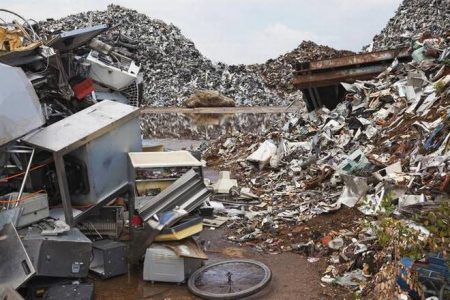Electronic-waste or E-waste dumping 23/05/2019 – Posted in: Daily News – Tags: cop meeting, e-waste, waste management rule
INDIA SETS TONE ON E-WASTE DUMPING
For: Mains
Topic covers: E-waste, E-waste issues, Import issues, PIC procedure
News Flash
The potential “dumping” of e-waste in India under the guise of reuse and repair, along with including the entry of mixed, contaminated plastic waste in the Prior Informed Consent (PIC) category were the two issues where India intervened at the triple COP (Conference of the Parties) meetings.
The meetings involved conferences of the parties to the Basel, Rotterdam and Stockholm Conventions and were held in Geneva between April 29 and May 10 on the theme ‘Clean Planet, Healthy People: Sound Management of Chemicals and Waste’. Over 180 countries participated in the meetings.
The Prior Informed Consent (PIC) Procedure
|
Major Decision taken
- The transboundary movement of e-waste.
Waste from developed countries is sent to developing countries under the guise of reuse and repair. There is no accountability on the exporting country to take these back.
- Guidelines for reuse or repair of e-waste
Draft technical guidelines stipulated the conditions when used electrical and electronic equipment destined for direct reuse, repair, refurbishment or failure analysis should be considered as non-waste.
- Amendment in Convention
The decision to amend the convention to include unsorted, mixed and contaminated plastic waste under PIC procedure and improve the regulation of its trans-boundary movement.
- Earlier this year, India banned the import of plastic waste in the country.
- Prohibition of import of solid plastic
Plastic pollution is becoming a become a major environmental concern across the globe. India has already imposed a complete prohibition of import of solid plastic waste into the country. Even if some mislabelled waste reaches India, we can now ask the exporting country to take it back. Earlier, this provision was missing.
E-waste
- Electronic waste, or e-waste, is a term for electronic products that have become unwanted, non-working or obsolete, and have essentially reached the end of their useful life.
- E-waste is created from anything electronic: computers, TVs, monitors, cell phones, PDAs, VCRs, CD players, fax machines, printers, etc.
Growth of e-waste
India is one of the biggest producers of e-waste in the world. The Global E-waste Monitor 2017, published by the United Nations University, states that India generates about 2 million tonnes of e-waste annually and ranks fifth among e-waste producing countries, after the US, China, Japan and Germany.
Importing trouble
- India’s major problems is illegally imported e-waste.
- According to the Hazardous and Other Wastes (Management and Trans-boundary) Rules, 2016, importing e-waste for disposal is banned in India.
- United Nations Environment Programme says that China, India Malaysia and Pakistan are the main destinations for large-scale shipments of hazardous wastes, including e-waste, in Asia.
E-Waste Management Rules
- Notified in October 2016
- The manufacturers of electric and electronic equipments must facilitate their collection and return it to authorised dismantlers or recyclers.
- The law says that producers of electronic items should provide postal address, e-mail and toll-free numbers of collection centres—where consumers can drop their equipments—through websites and produceruser booklet to facilitate the return of e-waste items.
Source: Indian Express
You can follow us on LinkedIn and for more updates related to UPSC IAS Preparation, Like our Facebook Page and subscribe our Diligent IAS Youtube Channel

